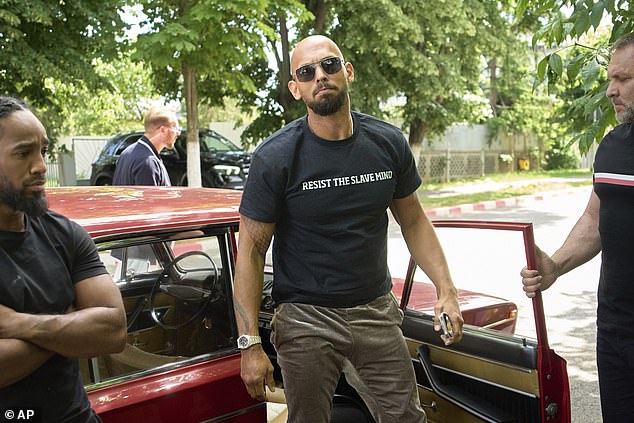Beauty influencers can be ‘just as toxic as Andrew Tate’, a psychiatrist has claimed.
Professor Matthew Sadlier believes attitudes towards young people’s use of smartphones need ‘societal change’.
He has seen a rise in extreme eating disorders in young patients and insists that certain influencers are as damaging as self-proclaimed misogynist Tate – who urges men online to ‘reject feminism’ and dominate women.
‘You go into that world with the beauty influencers: I think beauty influencers are just as toxic as Andrew Tate, they’re just toxic to a different population,’ he said during a Festival of Politics event at the Scottish Parliament.
‘The problem is, one video on how to put on whatever piece of makeup is probably reasonable. But how many people watch one video?’
Professor Sadlier, from Dublin’s Mater Hospital, believes social media is partly to blame for the issues young people are facing.
‘I would say it’s not that it’s creating new problems, but the people who have the problems who would’ve fallen into that vulnerability group are becoming more extreme,’ he added.
‘If you look at whatever percentage of adolescent girls will have eating difficulties, there’s similar problems with adolescent boys, but interestingly, it’s got to do with bodybuilding, overeating, steroid use.

A psychiatrist has claimed that beauty influencers can be ‘just as toxic as Andrew Tate’

Self-proclaimed misogynist Andrew Tate (pictured) urges men online to ‘reject feminism’ and dominate women
‘The videos around self-harm, there is an ecosystem about that that is very difficult to police.’
The Online Safety Act came into effect this year, providing a new set of laws that protect children and adults online.
It has given providers new duties to implement systems and processes to reduce the risk that their services are used for illegal activity, and to take down illegal content when it does appear.
Specific protections have been designed for children.
Platforms are required to prevent youngsters from accessing harmful and inappropriate content.
Discussing any changes that could be made to minimise the dangers of phone use among young people, Professor Sadlier said: ‘Adolescence and childhood is a transitory phase, with respect to the young people in the audience, you won’t be young for very long, so it’s the next group of young people.
‘Just because the current group of 12-year-olds have a mobile phone doesn’t mean the next group of 12-year-olds have to have a mobile phone.
‘We’ve been here before. We’ve been here with cigarettes… I remember when seatbelts were introduced in cars and people thought “this is going to be the worst thing, how can I drive with a seatbelt, we’re going to have crashes everywhere because I’m being constrained”. It does take a societal change.
‘It takes changing the paradigm for parents to go, actually you know what, a child trying to learn off a YouTube video is a child in a digital institutionalised environment where they’re learning to speak to YouTube, they’re not learning how to speak to a person.’
Tate, 38, is an American-British former professional kickboxer. He faces prosecution in Romania over allegations of trafficking minors, sexual intercourse with a minor and money laundering.
He denies the charges.











